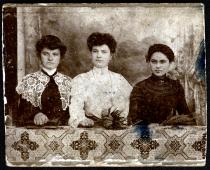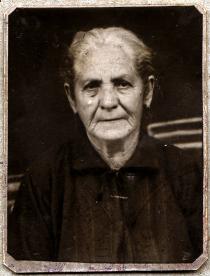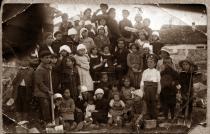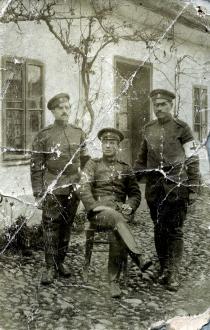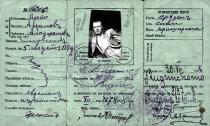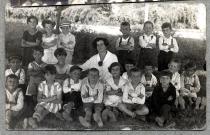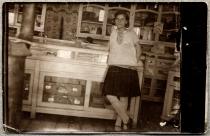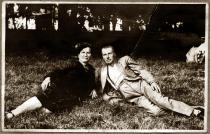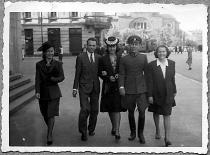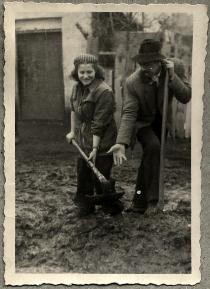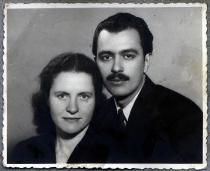This is an identity card for my father, Mosko Aladjem. He had been awarded a medal for bravery during one of the wars. My father was a very good man. He was an accountant and was radical in his political affiliations. He was elected deputy mayor of Vidin, and for several years he held that position. I remember that when they wanted to oust him, they broke all the windows of our house.
My mother, Buka Aladjem, was a hazan's daughter; she was strongly religious, and we observed Shabbat. My father, in spite of his modern views, attended the synagogue on Friday. He had been educated at a Jewish school and spoke Hebrew. My father was an administrative secretary of the Jewish community. My mother used to speak to us in Ladino, but we always answered in Bulgarian. My father didn't allow us to speak Ladino at home. He was a politician and wanted his children to keep abreast of the times.
My mother sewed. She often said humorously that she didn't need an education, because she knew the centimeter well.
There wasn't any anti-Semitism in Vidin, even in deportation times. My grandparents and my parents associated with the town's elite. My father kept company with Bulgarians. We lived in a Turkish neighborhood.
I was born in 1921, the youngest of five children. I graduated from a Bulgarian school. Although it had been quite common to study first at a Jewish school, and then in Bulgarian schools, I haven't studied Hebrew or religion, but my siblings have. My parents didn't teach me anything special in a religious sense.
I worked as a weaver at a silk factory in Sofia before World War II, and I returned to the job after we had been interned for two years during the war. When I went back to work, it was as though someone from high society had entered the factory. Almost the whole weaving workshop came out to greet me. During the internment, my colleagues supported me by sending parcels, money.
We stayed in Bulgaria because my mother didn't want to leave my father's grave. I married a Bulgarian, Anani Rizov, on January 18, 1946. My father-in-law was an old communist. When my mother-in-law wanted me to convert to Christianity, he jumped to his feet and told her not to interfere in our private family matters. We never spoke again of conversion.
We didn't keep the Jewish traditions at our home. We celebrated Christmas and Easter, the Bulgarian holidays. At 80, I bought a cookbook with Jewish recipes. It is now that I showed such interest.
My daughter, Sonia Doneva, was born on October 13, 1946. She has a degree in textile engineering - her father's profession. She is interested in any information concerning Jewry; she has Jewish friends and keeps in touch with them. My son, Georgi Rizov, is less involved in these things. He was born on November 8, 1955. He is a military doctor and doesn't have relationships with Jews to such a great extent.

